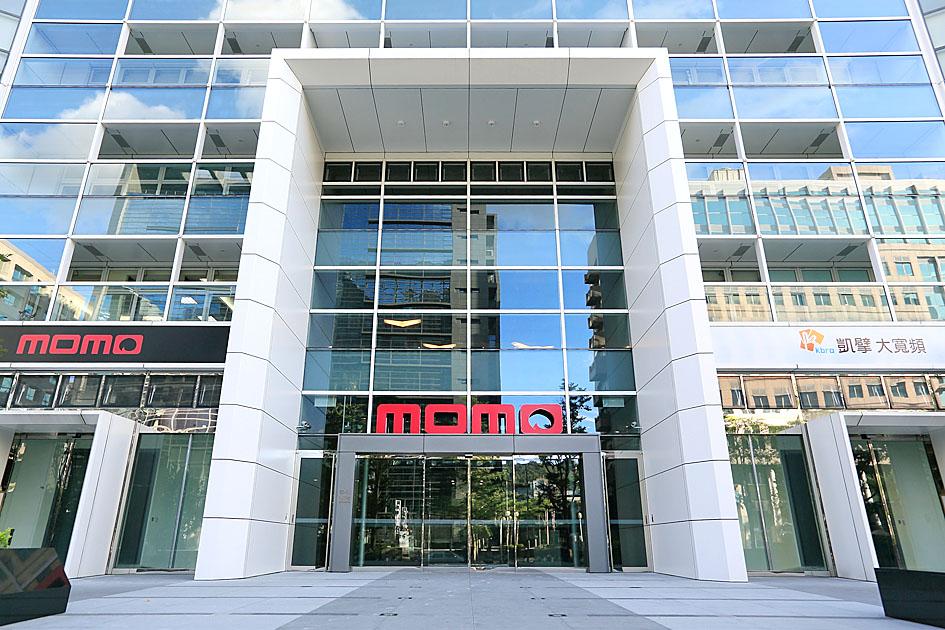E-commerce operator Momo.com Inc (富邦媒體) yesterday posted record revenue of NT$6.48 billion (US$227.5 million) for last month, up 25.6 percent year-on-year on the back of a “Double 12” shopping event that saw sales increase 36 percent year-on-year.
Revenue was also boosted by robust sales of electric heaters, dehumidifiers and winter clothing during a spate of cold fronts, the company said in a statement.
Sales of information technology products and home appliances grew 35 percent year-on-year last month, and those of health and beauty-related products increased 29 percent, it said.

Photo: Vanessa Cho, Taipei Times
The strong performance saw fourth-quarter revenue grow 30 percent year-on-year to NT$20.67 billion and boosted full-year revenue to NT$67.2 billion, up 29.6 percent, it added.
Local rival PChome Online Inc (網路家庭) on Sunday posted revenue of NT$4.17 billion for last month, up 13.66 percent year-on-year.
Purchases for Christmas, end-of-year sales, seasonal demand for consumer electronics and sales of New Year dishes supported the performance, the company said in a statement.
Meanwhile, downloads of the company’s mobile app exceeded 5 million and its number of new members increased by 50 percent year-on-year, suggesting that consumers are continuing to shift to online shopping, it said.
PChome said that electric appliances, such as heated blankets and electric heaters, were particularly popular last month, while sales of board games, mahjong and interactive games also increased, as more people celebrated New Year’s Eve at home due to the COVID-19 pandemic.
Corporate purchases of gifts for employees’ year-end parties significantly boosted shipments of consumer electronics, information and communication products, and gaming products, it added.
PChome’s cumulative revenue for last year was a record-high NT$43.87 billion, up 12.82 percent year-on-year, company data showed.

BYPASSING CHINA TARIFFS: In the first five months of this year, Foxconn sent US$4.4bn of iPhones to the US from India, compared with US$3.7bn in the whole of last year Nearly all the iPhones exported by Foxconn Technology Group (富士康科技集團) from India went to the US between March and last month, customs data showed, far above last year’s average of 50 percent and a clear sign of Apple Inc’s efforts to bypass high US tariffs imposed on China. The numbers, being reported by Reuters for the first time, show that Apple has realigned its India exports to almost exclusively serve the US market, when previously the devices were more widely distributed to nations including the Netherlands and the Czech Republic. During March to last month, Foxconn, known as Hon Hai Precision Industry

Taiwan Semiconductor Manufacturing Co (TSMC, 台積電) and the University of Tokyo (UTokyo) yesterday announced the launch of the TSMC-UTokyo Lab to promote advanced semiconductor research, education and talent development. The lab is TSMC’s first laboratory collaboration with a university outside Taiwan, the company said in a statement. The lab would leverage “the extensive knowledge, experience, and creativity” of both institutions, the company said. It is located in the Asano Section of UTokyo’s Hongo, Tokyo, campus and would be managed by UTokyo faculty, guided by directors from UTokyo and TSMC, the company said. TSMC began working with UTokyo in 2019, resulting in 21 research projects,

Ashton Hall’s morning routine involves dunking his head in iced Saratoga Spring Water. For the company that sells the bottled water — Hall’s brand of choice for drinking, brushing his teeth and submerging himself — that is fantastic news. “We’re so thankful to this incredible fitness influencer called Ashton Hall,” Saratoga owner Primo Brands Corp’s CEO Robbert Rietbroek said on an earnings call after Hall’s morning routine video went viral. “He really helped put our brand on the map.” Primo Brands, which was not affiliated with Hall when he made his video, is among the increasing number of companies benefiting from influencer

Quanta Computer Inc (廣達) chairman Barry Lam (林百里) yesterday expressed a downbeat view about the prospects of humanoid robots, given high manufacturing costs and a lack of target customers. Despite rising demand and high expectations for humanoid robots, high research-and-development costs and uncertain profitability remain major concerns, Lam told reporters following the company’s annual shareholders’ meeting in Taoyuan. “Since it seems a bit unworthy to use such high-cost robots to do household chores, I believe robots designed for specific purposes would be more valuable and present a better business opportunity,” Lam said Instead of investing in humanoid robots, Quanta has opted to invest